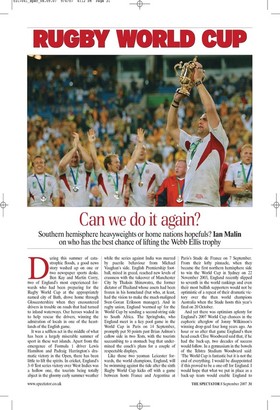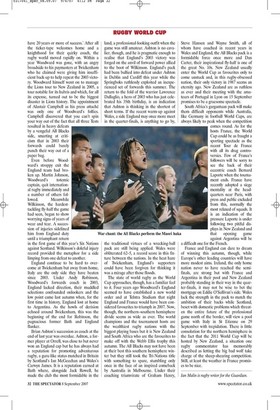Can we do it again?
Southern hemisphere heavyweights or home nations hopefuls? Ian Malin on who has the best chance of lifting the Webb Ellis trophy During this summer of catastrophic floods, a good news story washed up on one or two newspaper sports desks. Ben Kay and Martin Corry, two of England's most experienced forwards who had been preparing for the Rugby World Cup at the appropriately named city of Bath, drove home through Gloucestershire when they encountered drivers in trouble on roads that had turned to inland waterways. Our heroes waded in to help rescue the drivers, winning the admiration of locals in one of the heartlands of the English game.
It was a selfless act in the middle of what has been a largely miserable summer of sport in these wet islands. Apart from the emergence of Formula 1 driver Lewis Hamilton and Padraig Harrington's dramatic victory in the Open, there has been little to lift the spirits. In cricket, England's 3-0 Test series victory over West Indies was a hollow one, the tourists being totally abject in the gloomy early summer weather while the series against India was marred by puerile behaviour from Michael Vaughan's side. English Premiership football, mired in greed, reached new levels of crassness with the takeover of Manchester City by Thaksin Shinawatra, the former dictator of Thailand whose assets had been frozen in his homeland (but who, at least, had the vision to make the much-maligned Sven-Goran Eriksson manager). And in rugby union, England 'warmed up' for the World Cup by sending a second-string side to South Africa. The Springboks, who England meet in a key pool game in the World Cup in Paris on 14 September, promptly put 50 points past Brian Ashton's callow side in two Tests, with the tourists succumbing to a stomach bug that undermined the coach's plans for a couple of respectable displays.
Like those two yeoman Leicester forwards, the world champions, England, will be swimming against the tide after the sixth Rugby World Cup kicks off with a game between hosts France and Argentina at Paris's Stade de France on 7 September. From their lofty pinnacle, when they became the first northern hemisphere side to win the World Cup in Sydney on 22 November 2003, England recently slipped to seventh in the world rankings and even their most bullish supporters would not be optimistic of a repeat of their dramatic victory over the then world champions Australia when the Stade hosts this year's final on 20 October.
And yet there was optimism aplenty for England's 2007 World Cup chances in the euphoric afterglow of Jonny Wilkinson's winning drop-goal four long years ago. An hour or so after that game England's then head coach Clive Woodward said that, if he had the back-up, two decades of success would follow. In a gymnasium in the bowels of the Telstra Stadium Woodward said: 'The World Cup is fantastic but it is not the end of everything. I would be disappointed if this proved to be a one-off for England. I would hope that what we put in place as a back-up team would enable England to have 20 years or more of success.' After all the ticker-tape welcomes home and a knighthood for their quirky coach, the rugby world moved rapidly on. Within a year Woodward was gone, with an angry broadside to his paymasters at Twickenham who he claimed were giving him insufficient back-up to help repeat the 2003 victory. Woodward himself went on to manage the Lions tour to New Zealand in 2005, a tour notable for its hubris and which, for all its expense, turned out to be the biggest disaster in Lions history. The appointment of Alastair Campbell as his press attaché was only one of Woodward's follies. Campbell discovered that you can't spin your way out of the fact that all three Tests resulted in heavy defeats by a vengeful All Blacks side, smarting at criticism that in 2003 their forwards could barely punch their way out of a paper bag.
Even before Woodward's stroppy exit the England team had broken up. Martin Johnson, Woodward's totemic captain, quit international rugby immediately and a number of others followed. Meanwhile Wilkinson, the hardesttackling fly-half the game had seen, began to show worrying signs of years of wear and tear. A succession of injuries sidelined him from England duty until a triumphant return in the first game of this year's Six Nations against Scotland. Wilkinson's doleful injury record provided the metaphor for a side limping from one defeat to another.
England continue to be hard to overcome at Twickenham but away from home, Italy are the only side they have beaten since 2003. Under Andy Robinson, Woodward's forwards coach in 2003, England lacked direction, their muddled selections confounded onlookers and the low point came last autumn when, for the first time in history, England lost at home to Argentina. As the howls of derision echoed around Twickenham, this was the beginning of the end for Robinson, the pugnacious former Bath and England flanker.
Brian Ashton's succession as coach at the end of last year was overdue. Ashton, a former player at Orrell, was close to but never won an England cap but he has always had a reputation for promoting adventurous rugby, a guru-like status matched in Britain by Scotland's Ian McGeechan and Wales's Carwyn James. It is a reputation earned at Bath where, alongside Jack Rowell, he made the club the most formidable in the land, a professional-looking outfit when the game was still amateur. Ashton is no cavalier, though, and he is pragmatic enough to realise that England's 2003 victory was forged on the anvil of forward power allied to the boot of Wilkinson England's pack had been bullied into defeat under Ashton in Dublin and Cardiff this year while the Springboks ruthlessly exploited an inexperienced set of forwards this summer. The return to the fold of the warrior Lawrence Dallaglio, a hero of 2003 who has just celebrated his 35th birthday, is an indication that Ashton is thinking in the shortest of short terms. If the recent warm-up against Wales, a side England may once more meet in the quarter-finals, is anything to go by, the traditional virtues of a wrecking-ball pack are still being applied. Wales were obliterated 62-5, a record score in this fixture between the nations. In the heat haze of Twickenham, England's supporters could have been forgiven for thinking it was a mirage after those floods.
The state of world rugby as the World Cup approaches, though, has a familiar feel to it. Four years ago Woodward's England seemed to have established a new world order and at Telstra Stadium that night England and France would have been considered favourites to triumph in 2007. Now, though, the northern—southern hemisphere divide seems as wide as ever. The world champions and the tournament hosts are the wealthiest rugby nations with the biggest playing bases but it is New Zealand and South Africa who are the favourites to make off with the Webb Ellis trophy this autumn. The All Blacks may not have been at their best this southern hemisphere winter but they still took the Tr-Nations title with something to spare, stumbling only once in the face of an inspired comeback by Australia in Melbourne. Under their coaching triumvirate of Graham Henry, Steve Hansen and Wayne Smith, all of whom have coached in recent years in Wales and England, the All Blacks pack is a formidable force once more and Dan Carter, their inspirational fly-half is one of the great No. 10s. New Zealand usually enter the World Cup as favourites only to come unstuck and, in this rugby-obsessed nation, their only victory in 1987 seems an eternity ago. New Zealand are as ruthless as ever and their meeting with the amateurs of Portugal in Lyon on 15 September promises to be a gruesome spectacle.
South Africa's gargantuan pack will make them difficult opponents while Australia, like Germany in football World Cups, are always likely to peak when the competition comes round. As for the hosts France, the World Cup could be as fraught a sporting spectacle as the recent Tour de France with all its drug controversies. Few of France's followers will be sorry to see the back of their eccentric coach Bernard Laporte when the tournament ends. France have recently adopted a siege mentality at the headquarters near Paris, with press and public excluded from this, normally the most relaxed of squads. It is an indication of the pressure Laporte is under following two pitiful displays in New Zealand and that opening game against Argentina will be a difficult one for the French.
France and England can dare to dream of winning this autumn, though, while Europe's other leading countries will have more modest aims. Ireland, the only home nation never to have reached the semifinals, are strong but with France and Argentina in their pool and New Zealand probably standing in their way in the quarter-finals, it may not be wise to bet the mortgage on Eddie O'Sullivan's side. Wales lack the strength in the pack to match the ambition of their backs while Scotland, beset with domestic problems which threaten the entire future of the professional game north of the border, will view a pool game with Italy in St Etienne on 29 September with trepidation. There is little consolation for the northern hemisphere in the fact that the 2011 World Cup will be hosted by New Zealand, a situation one rugby commentator has memorably described as letting the big bad wolf take charge of the sheep-shearing competition. Still, at least the weather in France promises to be nice.




































































 Previous page
Previous page